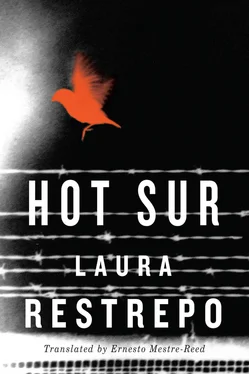Laura Restrepo - Hot Sur
Здесь есть возможность читать онлайн «Laura Restrepo - Hot Sur» весь текст электронной книги совершенно бесплатно (целиком полную версию без сокращений). В некоторых случаях можно слушать аудио, скачать через торрент в формате fb2 и присутствует краткое содержание. Год выпуска: 2015, Издательство: AmazonCrossingEnglish, Жанр: Современная проза, на английском языке. Описание произведения, (предисловие) а так же отзывы посетителей доступны на портале библиотеки ЛибКат.
- Название:Hot Sur
- Автор:
- Издательство:AmazonCrossingEnglish
- Жанр:
- Год:2015
- ISBN:нет данных
- Рейтинг книги:5 / 5. Голосов: 1
-
Избранное:Добавить в избранное
- Отзывы:
-
Ваша оценка:
- 100
- 1
- 2
- 3
- 4
- 5
Hot Sur: краткое содержание, описание и аннотация
Предлагаем к чтению аннотацию, описание, краткое содержание или предисловие (зависит от того, что написал сам автор книги «Hot Sur»). Если вы не нашли необходимую информацию о книге — напишите в комментариях, мы постараемся отыскать её.
María Paz is a young Latin American woman who, like many others, has come to America chasing a dream. When she is accused of murdering her husband and sentenced to life behind bars, she must struggle to keep hope alive as she works to prove her innocence. But the dangers of prison are not her only obstacles: gaining freedom would mean facing an even greater horror lying in wait outside the prison gates, one that will stop at nothing to get her back. Can María Paz survive this double threat in a land where danger and desperation are always one step behind, and safety and happiness seem just out of reach?
Hot Sur — читать онлайн бесплатно полную книгу (весь текст) целиком
Ниже представлен текст книги, разбитый по страницам. Система сохранения места последней прочитанной страницы, позволяет с удобством читать онлайн бесплатно книгу «Hot Sur», без необходимости каждый раз заново искать на чём Вы остановились. Поставьте закладку, и сможете в любой момент перейти на страницу, на которой закончили чтение.
Интервал:
Закладка:
That’s it for the Sleepy Joe thing. Could the murder really have taken place like that? There seems to be a lot missing, Rose thought, I’m not getting this, too removed from the real heart of the thing, the blind conviction, a rapture so profound that leads me to torture and kill. This truck driver’s advantage over me is so enormous, in that he defeats me with the simple gift of his faith. He is the one endowed with belief: that makes a huge difference, and tips the scales in his favor. He is very adept at the ritual sequence, vibrantly engaged in each of the stages leading up to the summit of pain. His acts are based on a millennial tradition that is foreign to me. He thinks himself a prophet, while I’m a nobody. He counts on enlightenment, while I heed my hydraulic engineer’s logic. That’s why I’ll never understand him and continue to despise him. “Stay put,” Rose commands himself, “don’t get all scattered.” How does Sleepy Joe work, or I should say torture? In the first instance, knife wounds in the hands, feet, and side, the stigmata of the cross. He inflicts them on his own brother. The nails, much more vile, he reserves for the dog. For Cleve, he reserves the crown and the humiliation of the thorns. In a way he crowns Cleve king, thus must consider him his principal victim, his most significant victory, at least up to now. Or maybe not. Maybe he just improvises according to the circumstances and choses the thorns mainly because they were readily available. The sharp weapon, thorns, nails, all elements toward maximum suffering. Each of the victims has been sacrificed or purified with one of these weapons. Does Sleepy Joe hate his victims? Not necessarily. It could even be the opposite. It seemed that he liked his brother. How does he choose them then? What are the criteria? Maybe the deciding factor isn’t the victim but the act itself. Undoubtedly, the common denominator is María Paz. Unless, that is, the guy went around conducting similar ceremonies on victims that had nothing to do with this case. Buttons and Ming were convinced of his more universal sacrificial tendencies, and there was Corina, María Paz’s Salvadoran friend.

Rose returned to the manuscript, which was his guide, his map, and reread the passages about Corina.
“Open your eyes, María Paz. Open your eyes and be careful. That boy is sick. I know what I’m talking about.”
And this:
“‘I think he was praying,’ she told me one of those days.
“‘Praying? Who was praying?’
“‘Your brother-in-law.’
“‘You mean he prayed that night in your house? Before he did what he did, or after?’
“‘During… like in a ceremony.’”
But what exactly was it that Sleepy Joe did to Corina, why did he violate her with a broomstick? Rose went down the kitchen to look for a broom. Once in the attic again, he brandished it against an invisible enemy. He worked up a sweat. Or was it a fever? He felt his head burning, as if he had made it through some threshold, and was about to completely break through.

If I were Sleepy Joe, what damage could I do with this? Strike or wield, or even rape, as I did with Corina? I could stick the head of an enemy on a broomstick as if it were a stake. Or pierce it through the victim. A sharp stick. A spear? A long, penetrating spear, prehistoric, frightful. The spear, the mother of all weapons for the Chinese, the blazon of Pallas Athena, the sharpened head made of steel, amber, bronze, and obsidian. Wasn’t Christ’s side pierced with such a spear? Lance, spear, Britney Spears? If I were Sleepy Joe, would I not have penetrated, pierced, violated Britney, Athena, or Corina with this lance, spear, broom? It is an elaborate scheme, but it holds together. If it was really like this, what next? What other techniques of martyrdom did Sleepy Joe’s imagination resort to? Which ones had he employed yet, or not?

Rose didn’t know. That is, what could the next victims expect, or what had he done to other anonymous victims? For one, the cross was missing, the final and most drastic torment, the zenith of the expiation. And he must employ others as well; Christ had to endure all sorts of horrors on the way to Cavalry. This is where the album that Edith sent came in.
Rome, a summer twilight, years before. Edith and Rose are holding hands and in love, or at least Rose is in love with Edith, who wears a light-colored, low-cut dress, from which her tanned cleavage peeks out. They are crossing the Sant’Angelo Bridge, and the impressive vision of Bernini’s angels greatly affects them: their violent, androgynous, dark beauty; their unlikely wings, which seem useless for flight; their anguished compassion before the suffering of the Son of God. They are less agents of glory than provocateurs in a cosmic duel, and each one holds in its hands one of the initiation props, or deadly weapons, depending on how you look at it. In the duty-free shop at the airport, Rose had bought a Canon AE-1, and in his enthusiasm to try it out took many pictures of Edith, including on that day, nine of which survive in that album, one in front of each angel, not counting a tenth that must have come loose, leaving behind only little sticker slots where the photograph had been. Looking at those pictures, some many years later, was dizzying, transporting in some fashion for Rose. He recounts to me how he simultaneously relived his wife’s abandonment and the death of his son, and that the brutal grip of that twin loss dragged him against his will, threatening to break him. So he decided to let go of the reins and be taken, release the resistance and go with it, submissively, in a hallucinatory journey propelled by a torrent of violent images.
Looking back on it now, he feels it was a deep plunge that almost drowned him. He began to look at the pictures one by one, trying to focus on the angels and letting the figure of his wife fade into abstraction. “Get out of the way, Edith,” he murmured to her, “this has nothing to do with you.” In her handwriting, written on the back of each of the pictures were details of the date the picture was taken, the name of the place, and any other pertinent facts. “That’s how she is,” Rose tells me, “she has to document and classify everything; her books are full of marginalia.” The first angel holds up a small pillar, more like a miniature version of one with a corresponding caption, Tronus meus in columna , my throne on a pillar, according to Edith’s footnoted translations.
“Bravo, Edith,” Rose told her, “you were always so systematic and organized, with everything except our marriage; you put me away like some old apparatus and you couldn’t even remember where. But focus, focus.” It’s the pillar used during the whipping. Rose remembered it well. During that trip to Rome, they had seen the original, the very pillar, in Santa Prassede, just a few steps away from the Basilica di Santa Maria Maggiore. Just like the replica held up by the angel, the original is short and stout, as if the Christ bound there had been a pygmy. Tronus, Rose wrote over the head of the angel, Tronus meus in columna. “Your name is Tronus, and you did wrong, extremely wrong, by binding that pygmy.”
The following angel holds up a whip, and the inscription reads, In flagella paratum , ready for the whip. “Flagella will be your name,” Rose told the angel. “Break down the Christ Almighty with a lacerating whip of seven tails, because that’s your task: whip the chosen one until he bursts.” The next angel has two heavy large nails in his hand. Quem confixerunt , the things that perforated me. Rose wrote a name above the angel: Clavus. “Cleave and nail the angel with this name. Nail the victim to the wall, pierce it, perforate, like a dog: leave it crucified until it dies. Take a poor dog and transform it into a god, or take a god and deal with him as if he were a dog.” The angel on the next page in the album holds a cross. A sanguinis lingo , from the tree that bleeds. Cross, crossed, crossing, cruising, cruiser. Rose’s thoughts dashed to the cruise he had taken with Edith to the Greek islands. Did you love me, Edith, that night in Santorini? Did you even love me then? But he immediately caught himself and abandoned that memory. “Focus, focus,” he told himself. “Stay with this thing.” This powerful angel with barely a squint in his eyes is holding a cross, this is his fragmenta passionis , or at least that’s what Edith noted, good old Edith throwing around those Latin phrases. The great winged squinter holds up the cross as if it were nothing, as if it were weightless, as if the cross itself were also winged, the wood of death that curiously enough is also the tree of life, the conflux of the four cardinal points, the compass rose, rosa rosa rosam rosae rosae, of course, a rose is a rose is a rose, and that’s his name, Rose, Rosicrucian, the rose that hugs the cross, at the intersection, the crossroads, fingers crossed for good luck. The cross, object of danger and risk, doorway to other worlds, a dizzying reality of conflicting realities, life and death, heaven and hell, man and God. The point where the boundary between the zenith and the abyss vanishes. Wasn’t that more or less what old Ismaela Ayé wailed about behind the walls of Manninpox? If Ismaela Ayé could conceive it, so could Rose, who took up his pen and christened that angel Crux. “Hi, Crux,” he told him. “So you will be known.” The inscription on the angel who holds the spear with which they stabbed Christ on the side reads Vulnerasti cor meum , you have wounded my heart. A powerful phrase; the Lord Christ wasn’t a bad poet, or the credit would actually have to go to Bernini. Rose decided that angel would be called Cor, the angel revealed its own name, cor, cordis, the core; besides, the letters look perfect, C, O, R , spaced on the photograph, somewhat humorous to Rose because the O just happened to encircle Edith’s face as she stands on a pedestal in the picture. Let’s see you escape that and fly away with Ned to Sri Lanka. “Dismissed, Cor!” Rose ordered the angel. “I leave you with Edith, a very bad girl. You’re in charge of her. And let’s go on, everything marches on, I have pulled one string and now the whole skein is coming undone at full speed.” Cor: the name is also connected to Corina. “They drove that spear through your heart, Cori? No, he drove it through your pussy, the axis mundi , the heart of hearts.”
Читать дальшеИнтервал:
Закладка:
Похожие книги на «Hot Sur»
Представляем Вашему вниманию похожие книги на «Hot Sur» списком для выбора. Мы отобрали схожую по названию и смыслу литературу в надежде предоставить читателям больше вариантов отыскать новые, интересные, ещё непрочитанные произведения.
Обсуждение, отзывы о книге «Hot Sur» и просто собственные мнения читателей. Оставьте ваши комментарии, напишите, что Вы думаете о произведении, его смысле или главных героях. Укажите что конкретно понравилось, а что нет, и почему Вы так считаете.












